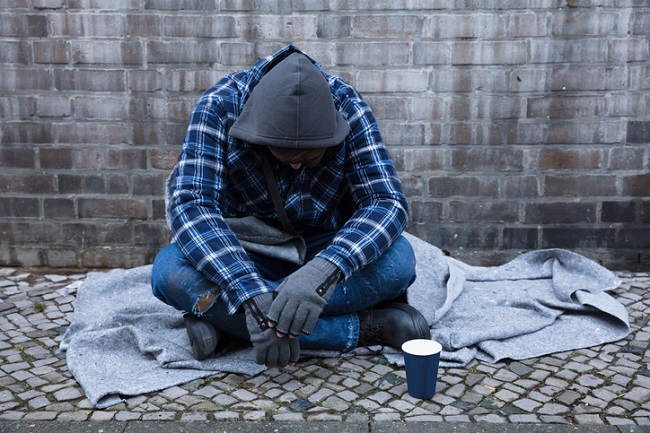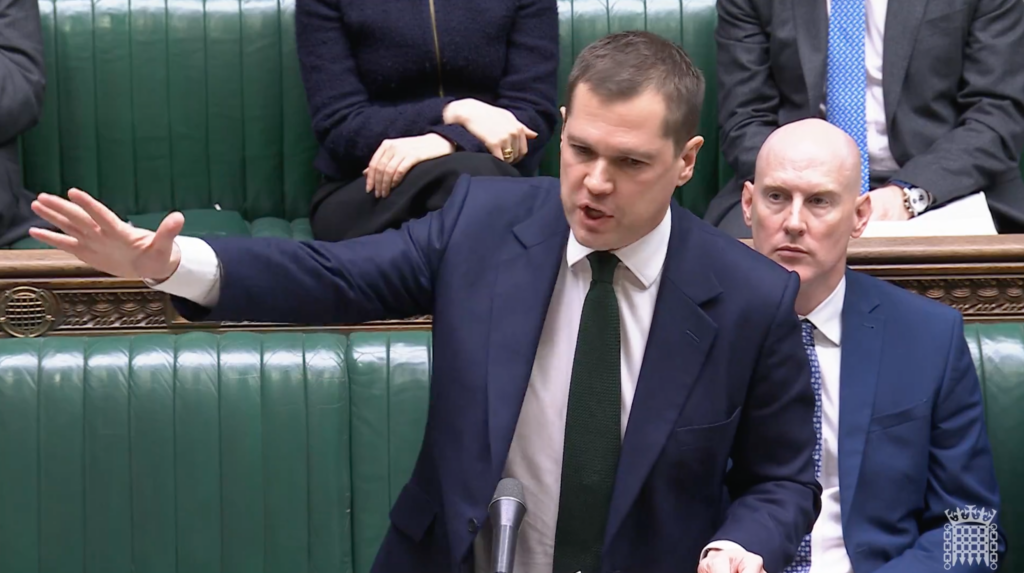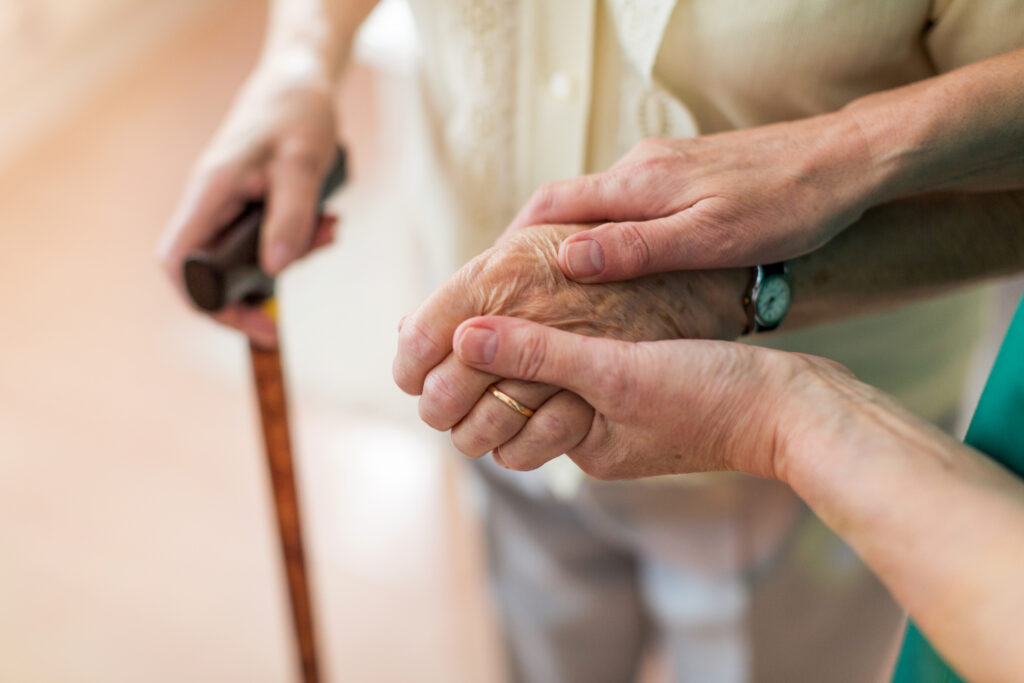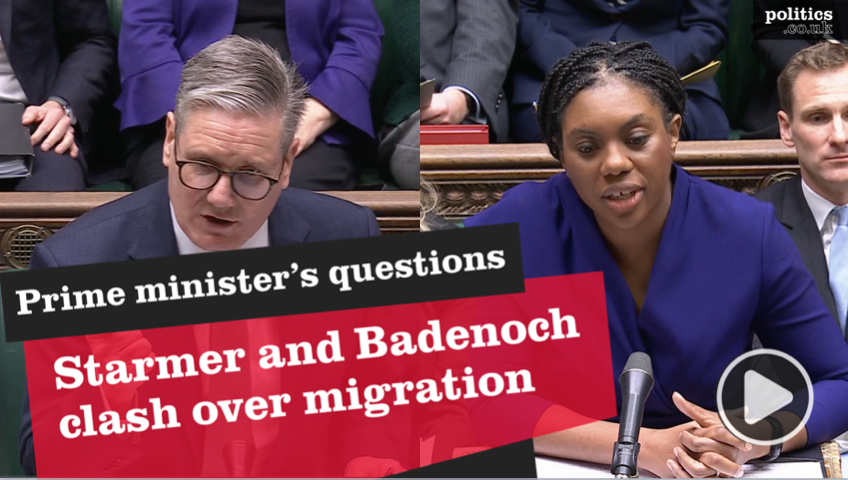What is begging?
Begging is the solicitation of money or food, especially in the street. There is a close relationship between begging and homelessness. Homeless charity, Crisis, estimates that over 80 per cent of beggars are homeless.
People who beg are among the most vulnerable in society, often trapped in poverty and deprivation, and it is regarded as a risky and demeaning activity.
Begging is visible on the streets of many British towns and most of the public report seeing someone begging in a public place at least once a week. Research carried out by the University of Glasgow found that begging was overwhelmingly driven by need rather than greed, although an increasing prevalence of begging is coupled with the increased perception in some quarters, that beggars, rather than being homeless and hungry, use the money they receive to support their addiction to drugs or alcohol.

Begging is illegal under the 1824 Vagrancy Act.
Is begging illegal?
Begging has been illegal in the UK for almost two centuries under the 1824 Vagrancy Act. It does not carry a jail sentence under the Act. The maximum sentence is a fine at level 3 on the standard scale (currently £1,000).


In a clear indication of the ancientness of the provision, Section 4 of the Vagrancy Act 1824 (as amended) makes provision for a number of offences, including ‘wandering abroad and lodging in any barn or outhouse, or in any deserted or unoccupied building, or in the open air, or under a tent, or in any cart or wagon, and not giving a good account of himself or herself’.
Following its introduction by the Crime and Disorder Act 1998, the Anti-Social Behaviour Order (ASBO) was used extensively by local authorities attempting to address problems associated with begging.
In 2014, the Anti-Social Behaviour, Crime and Policing Act 2014 replaced the ASBO, and other disparate powers developed to tackle a range of anti-social behaviour. Two of these in particular have been used in certain parts of the country to combat begging.
The Public Spaces Protection Order, allows councils to impose conditions on activities that people may carry out in a designated area.
Whilst Section 35 of the Act allows a police officer to disperse individuals or groups causing or likely to cause anti-social behaviour in public places or common areas of private land (such as shopping centres), directing them to leave a specified area and not return for up to 48 hours.
Controversies
Begging was made a recordable offence in December 2003 as part of the then Labour Government’s drive to tackle crime and anti-social behaviour. The Government claimed the change would “help tackle the anti-social behaviour of some aggressive beggars, which can intimidate the public, leading to increased fear of crime”.
It would also, they said, allow the police to identify repeat offenders and make it easier for them to deal with beggars involved in more serious crime.
But the move was strongly criticised by civil rights groups, the Liberal Democrats and organisations dealing with the homeless. The charity, Crisis, warned that moves to make begging a recordable offence and tackle it through the criminal justice system were “inappropriate, ineffective, costly and will not work as they do nothing to tackle the root causes of begging”.
Beggars have generally experienced a disruptive family background, substance abuse, exclusion from the labour market and institutionalisation and often have an acute lack of self-esteem. Many beggars have at some time found themselves victims of violence and harassment from the public. Many people begin to beg because they are not receiving benefits when they first start to sleep rough. There has long been a strong relationship between begging, substance misuse and poor physical and mental health.
The Joseph Rowntree Foundation have expressed concern that enforcement activity in one area simply displaces street activity to another geographical area, and can sometimes lead to the activity turning from begging into acquisitive crime.
At the 2019 General Election, the Labour Party was committed to the repeal of the 1824 Vagrancy Act which first made begging illegal.
Statistics
The number of people sleeping rough in England has more than doubled from 1,768 in 2010 to 4,677 in 2018. [Source – Ministry of Housing, Communities and Local Government, 2019].
In 2017, some 1,025 people were prosecuted under the 1824 Vagrancy Act, down from 1,979 in 2007. [Source – Ministry of Justice figures]
A 2016 survey by the Charity, Crisis, of more than 450 rough sleepers in England and Wales found that 73% of rough sleepers had experienced some form of enforcement in relation to their sleeping rough in the previous 12 months. Of these enforcement experiences: 70% were informal measures; 56% had been moved on by the police or an enforcement agent within the previous 12 months; 35% had found it difficult to find anywhere to sleep or rest in the previous 12 months because of defensive architecture; 20% had experienced noise pollution in the previous 12 months effecting their ability to sleep and rest; and 21% had experienced the street cleansing or ‘wetting down’ of sleeping areas in the previous 12 months. [Source – Crisis, 2016]
Quotes
“We understand that councils and the police have to strike a balance between the concerns of local residents and the needs of rough sleepers, and where there’s genuine antisocial activity, it’s only right that they should intervene. Yet people shouldn’t be targeted simply for sleeping on the street. In fact, homeless people are far more likely to be victims of crime than perpetrators, and rough sleepers are 17
times more likely to be victims of violence compared to the general public. They deserve better than to be treated as criminals simply because they have nowhere to live” – The Chief Executive of Crisis, Jon Sparkes, 2017.
“Begging is an emotive issue as there are people who live on the streets of Wolverhampton who have serious personal and financial problems. We speak to these people when we first encounter them to try and get help when they genuinely have no shelter and no money. However, there are also some who use begging as a way of making money – and sometimes they are threatening and intimidating to shoppers. We refuse to tolerate this, so we use all the powers open to us to stop them from harassing visitors to the city centre.” – Sergeant Steve Edwards, Wolverhampton City Centre neighbourhood policing team – September 2010.

























